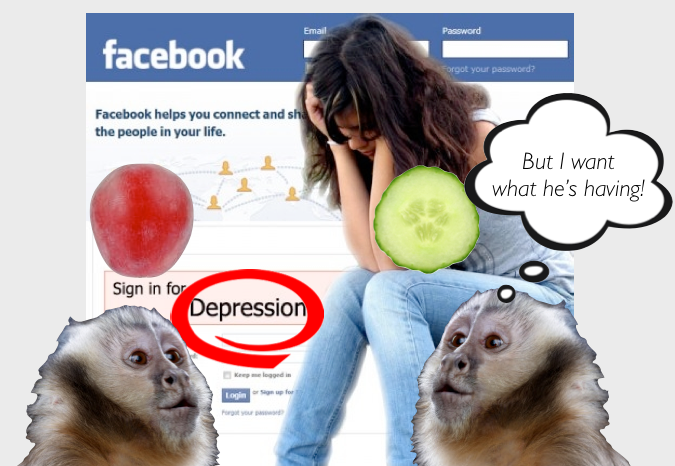
Have you ever noticed that you sometimes feel a little flat after spending time on Facebook?
A study by Kross et al. (2013) found that young people experience lower levels of subjective well-being after spending time on the social media site.
Why would this be?
Some scholars argue that it’s because we compare.
According to social comparison theory this is what we do as humans: we compare ourselves to others all the time. And we learn to do this from a very young age. Even capuchin monkeys do this.
There was an experiment conducted by Brosnan and de Waal (2003) where they made capuchin monkeys work for rewards. For the first experiment, both monkeys were given a piece cucumber as a reward for their efforts. Both monkeys seemed happy with this.
But then one of the monkeys started receiving grapes instead of cucumber. Did the little monkey who was still receiving cucumber notice this? Of course. And he wasn’t happy.
In protest, he started throwing his cucumber pieces at the researcher! You can see the video footage here.
We may not realise it but sometimes we can be a bit like that little monkey when we go on Facebook. We have our eye on what others have and do and many of us feel sad and inadequate as a result. But more on this shortly.
The psychology of comparing
According to the psychological literature, there are two types of comparison we can engage in: 1) downward comparisons, and 2) upward comparisons.
When you compare up, you compare yourself to people who seem to be better off than you. These people have better grades, better looks and better things. “If only I was smarter like them, my life would be better!” you think to yourself.
Engaging in upward comparisons usually leaves us feeling a little ‘meh’ and lacklustre about our lives.
On the other hand, downward comparisons involve comparing yourself to people who appear to be worse off than you. How do you feel after making downward comparisons? Pretty good about the state of your life!
This is why Facebook may make you miserable…
When you’re on Facebook most of the time you’re engaging in upward comparisons. This is largely due to the dominance of ‘self-promoting’ status updates.
Researchers have proposed three classes of status updates:
1) Updates that reveal negative emotions and existential angst (e.g. “Having a bad day. Sometimes I wonder what the point of it all is”);
2) Updates recording ‘pooterish banality’ (e.g. “watching Breaking Bad with the cat on my lap while drinking a banana milkshake. Can’t complain.”); and
3) Updates that are self-promoting in nature (e.g. “Just signed the book deal with the publisher! Time to pop the champagne!”).
Due to evolutionary motives, most of us post updates that fall into category 3. We have a tendency to post the best bits of our lives online. The most exciting parts. We’ve all seen it: a delicious meal out with friends. Holiday snaps by a pool in Bali. A selfie with a famous person.
I know one person who posts continuously about his adventures around the world, his meetings with celebrities and appearances at award nights with him holding multiple trophies. Boy, does he sure make his life look exciting! But when I look at his updates, I feel inadequate and exhausted.
When your goal in life is to be happy
Once your basic needs are met and your goal in life is to be happy and achieve some level of success, then Facebook is a potential avenue for you to become miserable and depressed.
After all, how do we measure how successful we are? It’s all relative to others.
We look at Johnny standing by his new Porsche after he’s been given the keys from the dealer, we see a friend has just graduated with a PhD and another has just published her third book that is set to become a bestseller. And we don’t feel so good.
As Blease (2015) states:
“Being confronted by conspicuously and overwhelmingly positive impressions of one’s Facebook friends increases the occasion for comparative evaluations; and escalates the risk for negative appraisals: Facebook presents more opportunities to feel like a loser”
So what can we do to avoid feeling like a loser?
You could try shifting your perspective. Neuroscientist Dr Sam Harris asks the question:
“Do you want to be inspired by the creativity and success of others or do you want to be diminished by it?”
Dr Harris suggests if you want other peoples’ success to be a source of joy and inspiration for you (rather than to diminish you) then it may be a matter of shifting your thinking. As he says, we tend to think:
“There are only 10 slices of pie and every piece that is taken is less for me!”.
Perhaps there is enough pie (i.e. opportunities) out there for all us. Thinking in this way can help us to rejoice in the successes of others rather than feel envious.
It’s also important to keep in mind that people’s Facebook profiles are completely manufactured and not an accurate portrayal of reality. It’s a curated life. As Wallman reminds us in his book ‘Stuffocation’:
“Your friends’ lives may well not be so perfect…life for most people, after all, is not a flawless timeline of weekends away and weddings in glamorous places. And if you stop to think about it, you know that.
But it is hard to keep that in perspective and not be affected by all those sunsets, sunrises, and lunches of the verandah. And since we are all connected to so many people on Facebook, there is always someone jetting off to Costa Rica, having lunch in Lima, lounging on a boat in the Mediterranean, or attending a wedding in Marrakech.
…So each time we check in, we cannot help but feel that our lives are so much smaller, hollower, and frankly, more earthbound than those of our friends who are off doing glamorous things. This constant bombardment leaves us feeling always at the bottom of the pile looking up”.
But perhaps the antidote to feeling like a loser may be to simply spend less time on Facebook. As Blease (2015) proposes, we are more likely to feel depressed by Facebook when we:
a) have more online friends;
b) spend a lot of time reading the updates of a wide pool of ‘friends’;
c) frequently read these Facebook updates;
d) read updates that tend to be bragging in nature; and
e) access Facebook as a solitary pursuit.
Spending less time on Facebook limits your exposure to content that may result in upward comparisons. Or if you don’t like that idea, you could unfollow ‘friends’ who tend to brag or go one step further by artfully doing a ‘friend cull’.
So next time you’re scrolling through your Facebook feed and you start to feel a pang of inadequacy, remind yourself of that little capuchin monkey. Remind yourself that you’re in a distorted landscape, where people are driven by evolutionary motives to present themselves in the best possible light. And instead of throwing some cucumber in protest at the screen, log off and go do something else.
References
Blease, C. R. (2015). Too many ‘friends,’too few ‘likes’? Evolutionary psychology and ‘Facebook depression’. Review of General Psychology, 19(1), 1.
Brosnan, S. F., & De Waal, F. B. (2003). Monkeys reject unequal pay. Nature, 425(6955), 297-299.
Kross, E., Verduyn, P., Demiralp, E., Park, J., Lee, D. S., Lin, N., . . . Ybarra, O. (2013). Facebook use predicts declines in subjective well- being in young adults. PLoS One, 8, e69841.
Share This:
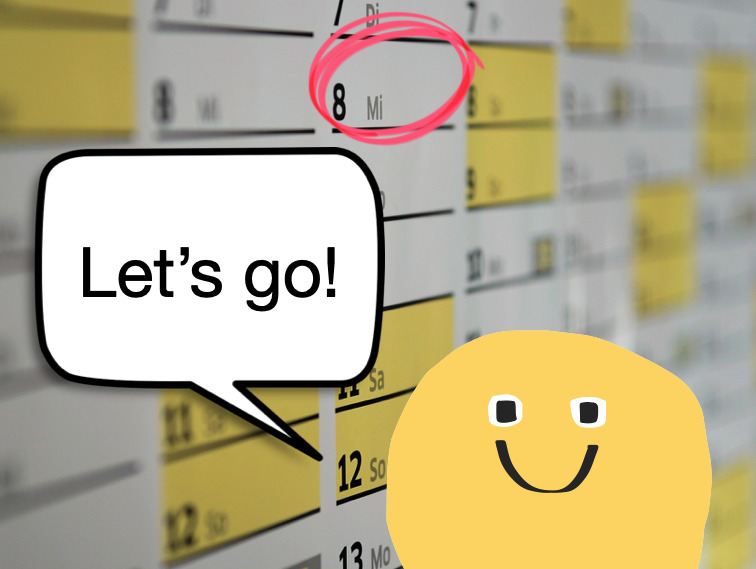
But how much time do you actually have?
It’s hard to get a sense just by thinking “My exam is in three weeks.” After all, three weeks sounds like plenty of time, right?
Don’t be fooled. This is your brain playing tricks on you.
No one ever has a full three weeks (504 hours) to prepare for an exam. Thrown into the mix is time for sleep, getting ready for school or work, working on assignments, socialising with friends and family, etc. Plus, you usually have more than one exam to study for.
But we can forget this. And when we do, we end up procrastinating with our work and it piles up for our future selves to deal with.
What’s missing is that your brain needs clear visual feedback. It needs to have a sense of the big picture (i.e., all your commitments laid out in front of it).
By using a year-at-a-glance calendar.
Earlier this year, I printed out a massive year-at-a-glance calendar (A0 size).
I scheduled all my upcoming presentations, holidays, important events (e.g., birthdays), deadlines, etc., onto the calendar and placed it in a prime position where I couldn’t miss it.
This calendar has made all the difference. It grounds me in reality, helps me feel more in control of my schedule, and gives me clear visual feedback. It also makes me think twice before I agree to take on a new project.
In the past, whenever I’ve said yes to a new opportunity, I haven’t always been grounded in reality. Too many times, I’ve been unintentionally cruel to future Jane.
Let me explain . . .
Back in 2016, I was on the home stretch with my PhD. The path forward was clear. After years of struggling with my PhD, the end was in sight. I was on track to hand in my thesis in a few months’ time.
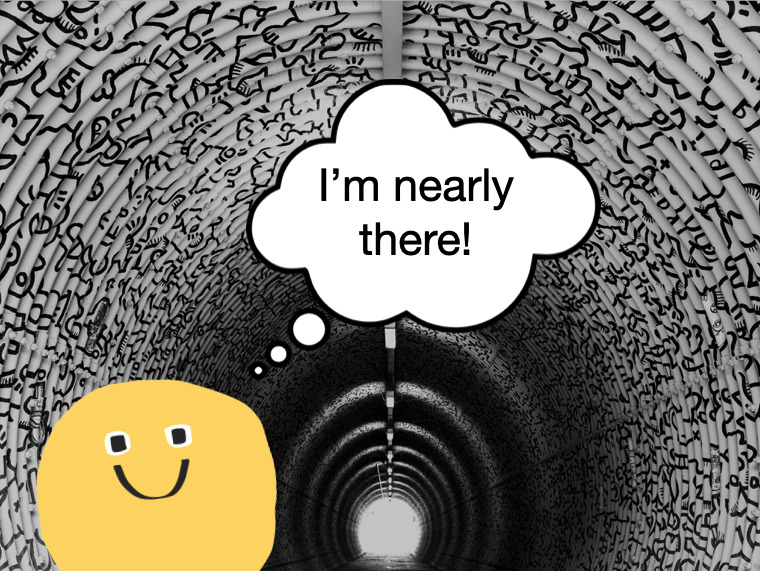
But then something happened that threw me off course (well, erm, I threw myself off course).
I was asked by a company to run a series of workshops. Without even thinking, I said “Yes! I’d love to!”. It seemed like a great opportunity. One that was too good to pass up.
When I shared the news with my PhD supervisor, she seemed to think differently. Her face said it all: a mixture of concern and confusion.
“Why did you say yes to this? Do you need the money? What about your PhD? You’re so close to finishing”, she said.
The truth was I didn’t need the money. I said yes because without having my other commitments staring me in the face, I had all the time in the world. I was engaging in magical (delusional) thinking. I fantasised about having superhuman capabilities and being able to do it all.
I was wrong. There were only so many hours in the day, and something had to give.
To cut a long story short, pretty quickly the magical thinking wore off, and I regretted taking on the job. I had burdened my future self with a ridiculous amount of work and unnecessary stress.
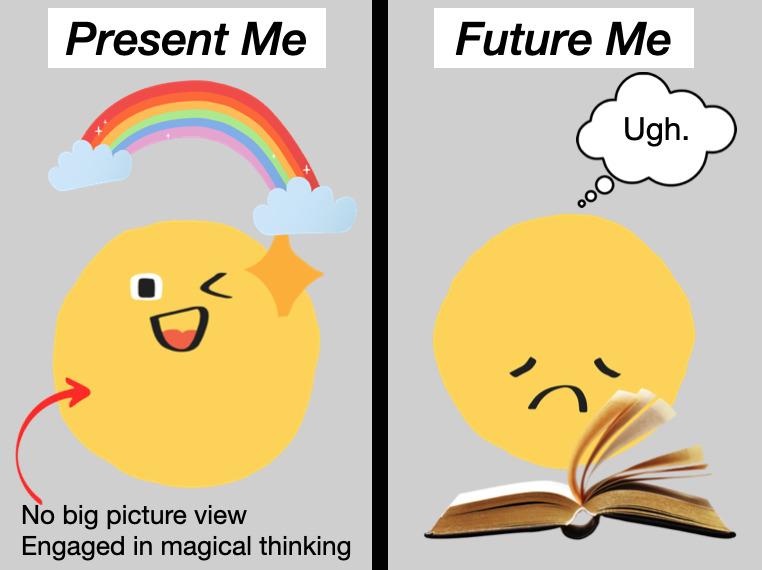
But worst of all, I had delayed handing in my thesis by several months. A few months might not sound like much in the big scheme of things. But when you’ve been plugging away at a PhD for seven years, every month becomes precious. I risked losing momentum.
If I could teleport back in time and place a year-at-a-glance calendar in my office space, I like to think that I would have prioritised my PhD over the shiny new opportunity.
I recently finished reading an excellent book called ‘The Extended Mind: The Power of Thinking Outside the Brain’ by Annie Murphy-Paul.
In this book, Annie explores nine principles for expanding our intelligence (note: these principles are not taught in schools). She argues that instead of pushing our brains to work harder and harder, we can use our bodies, relationships, and surrounding environment to boost our cognitive abilities.
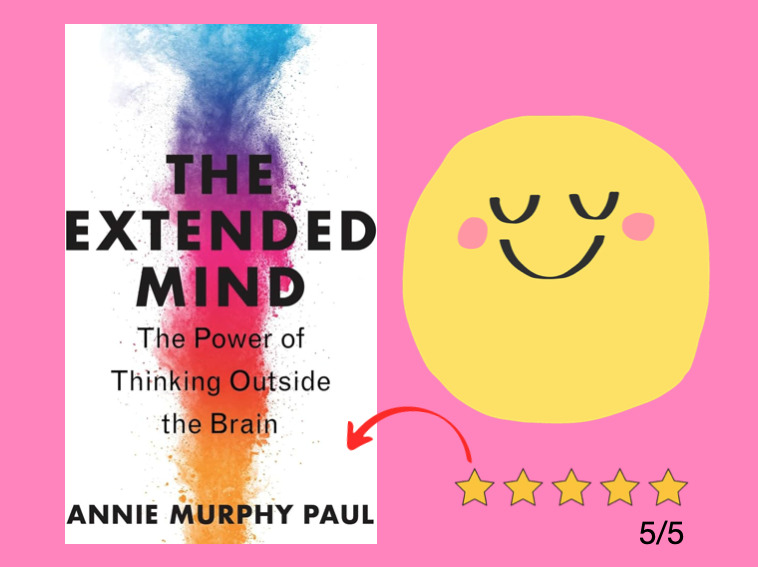
In the chapter called “Thinking with the Space of Ideas”, she writes:
“Whenever possible, we should offload information, externalize it, move it out of our heads and into the world. It relieves us of the burden of keeping a host of details “in the mind,” thereby freeing up mental resources for more demanding tasks like problem solving and idea generation.”
After reading this book, I understood why a year-at-a-glance calendar can be such a powerful tool. Seeing all your projects and commitments in one glance allows you to think smarter and more strategically.
These calendars also help to orient you in time. You can see how much time you have between now and doing the things you need to do.
Your projects and deadlines stare back at you every day. There’s no escaping them.
Seeing your life in this way also helps you to plan and pinpoint busy periods.
Here’s an example . . .
This month, I have more presentations scheduled than usual. This means I need to manage my energy levels, prioritise sleep, and eat healthily.
But a quick glance at my calendar tells me I have a few ‘free’ days before all these talks begin. I can use this time to cook a few meals to pop in the fridge and freezer to make life a little easier during this busier period.
One of the worst things I can do when I get busy is order takeaway food and sacrifice sleep to work. I refuse to do it as it always backfires. If I’m functioning at half capacity, my talks and work will suffer.
These calendars can also provide useful information to help you manage your energy levels, reduce ridiculous workloads, and avoid burnout.
Earlier this year, there was a week when I delivered more talks than usual. During this week, I found myself taking 15-minute power naps between talks to recharge before the next one. Even with all these power naps, by the end of the week, I felt tired. I drew a tired little emoji face on my calendar to represent this.
That tired emoji face is a constant reminder: you have mental and physical limits. Don’t overdo it.
It’s important to find a calendar that is both aesthetically pleasing and functional for you. This means you probably can’t just go to the shops and pick something off the shelf.
You could order a hard copy calendar online, but when the year is already well underway who wants to potentially wait weeks for their calendar to arrive in the mail?
You can purchase a digital download online and take it to your local print shop on a USB stick. Some templates display the month as a long list of days; whereas other calendars group the month into weeks, with each week on a separate line (see examples below).
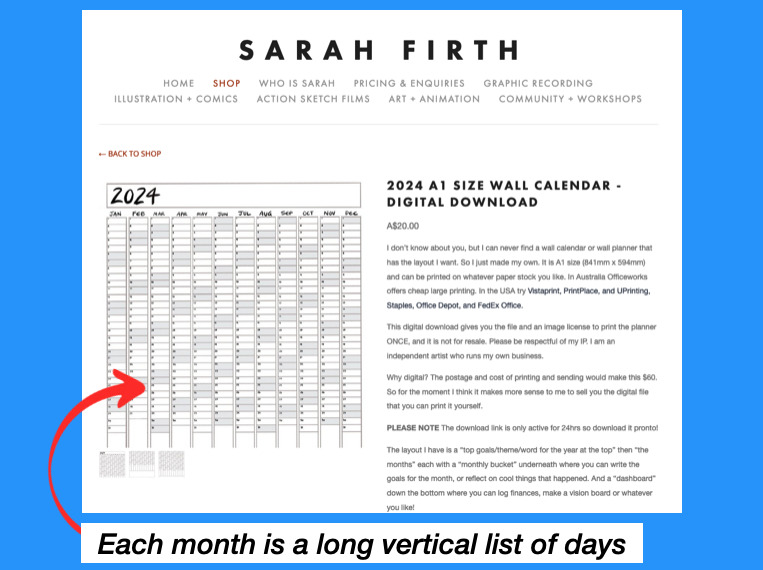
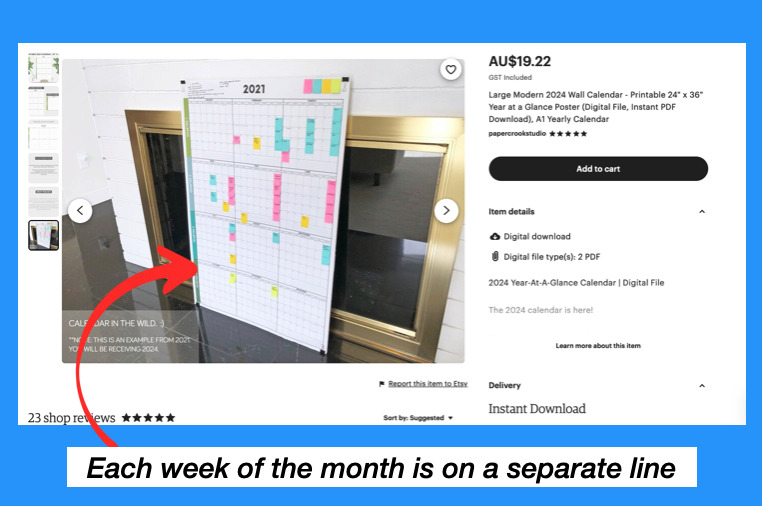
Alternatively, you could buy a monthly calendar, cut it up, and stick it together.
One of my friends suggested I try doing this. I gave it a shot, but my calendar looked like a failed arts and crafts project (with messy bits of tape plastered everywhere). Plus, the boxes were too small and cramped my style.
After some trial and error, I purchased a digital download from Etsy for $20AUD and printed it A0 size for $10AUD. All up, my calendar cost me $30AUD – money that was well spent.
The bottom line is you have to figure out what works for you and how much you’re willing to spend.
• Write on the calendar when all your exams, appointments, special events, and major projects will take place.
• If you don’t yet know the specific dates of each exam, note the week they begin and assume the worst-case scenario (your exams will be sooner rather than later).
• Consider laminating your calendar so you can use whiteboard markers on it.
• If laminating is too expensive, use sticky notes and washi tape instead.
• You can mount your calendar on core-flute material or foam board to give it a sturdier structure.
• Resist the urge to put every detail on your calendar. Focus on the big project deadlines, appointments, exams, etc. The details for what and when you work on each project can go into your weekly planner and/or on your to-do list.
• If you have the wall space, consider printing your calendar A0 size (841mm x 1189mm). You want plenty of space to write in each box.
In our noisy world where we are bombarded with endless opportunities, many of us would benefit from embracing analog tools like the year-at-a-glance calendar. These calendars help to ground us in reality and focus our minds on what matters.
If you have a lot going on in your world and find yourself saying “Yes!” to every shiny new opportunity that comes your way, do yourself a favour and create a year-at-a-glance calendar. Having your commitments stare you in the face every day is a simple but powerful way to live with greater focus and intentionality.
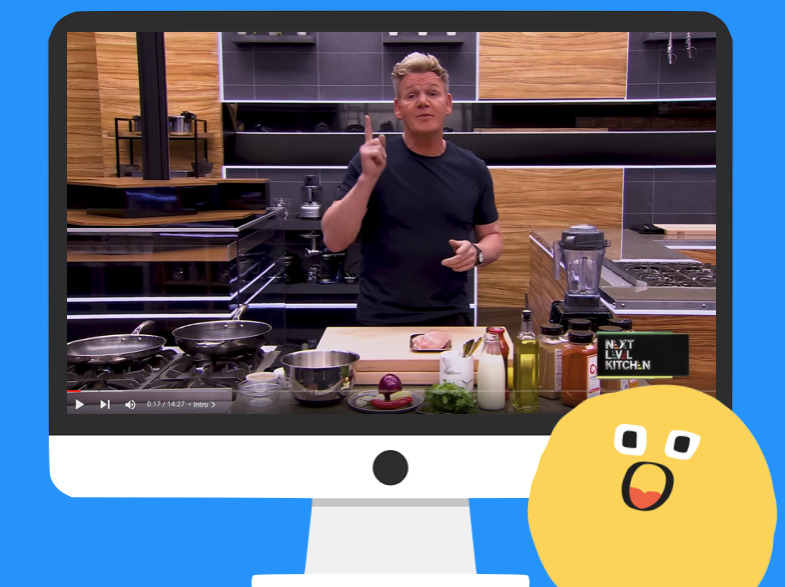
I recently watched a video of Gordan Ramsey cooking a ‘curry in a hurry’ (a butter chicken dish).
I was spellbound by the way Ramsey seamlessly cooked this dish. He was in flow and fully focused on the task of cooking the butter chicken.
What allowed him to whip up this dish plus a serving of rice in under 15 minutes?
Being organised helped a lot. Before he started cooking, chef Ramsey had all the ingredients and cooking utensils out on the bench, ready to go.
In chef’s speak, he had prepared the mise en place.
Mise en place is a culinary skill that can help us to study and work more efficiently. In this article, I explore this concept and how you can apply it to your life to help you stay calm, focused, and in control of your studies.
The mise en place is a French term that translates to “putting in place”. It means a place for everything and everything in its place.
Everything the chef needs is within arm’s reach. When it’s time to start cooking the dish, the chef knows where everything is. This allows the chef to focus on cooking the dish and stay calm and grounded under pressure.

In the book Kitchen Operations (a textbook for hospitality students and apprentice chefs), the authors write about the importance of being organised in the kitchen. They state:
“The ability to work in an organised manner is possibly the most important quality that anyone working in the preparation and service of food can demonstrate. You must develop this ability to complete the expected workload in the time available. Failure to be methodical in your approach will reduce efficiency and will lead to feelings of stress and frustration.”
The mise en place helps the chef avoid unnecessary stress and frustration.
Imagine the following scenario . . .
A chef starts cooking a pasta sauce.
The chef realises 10 minutes in that he is missing a key ingredient (tins of tomatoes).
The chef has to run to the shops to buy the tomatoes.
Chefs can’t afford to have that happen. They are time-pressured. They need to get meals out quickly to hungry customers.
The mise en place helps chefs avoid stressful situations like this. It can also help you decrease unnecessary stress, drama, and frustration associated with homework and study.
Before starting your work, set yourself up with everything you need to complete the task.
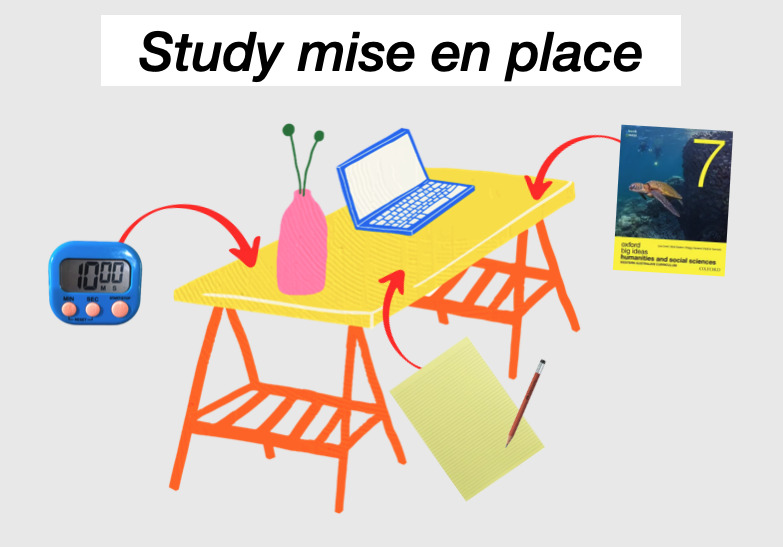
Think of this as the study desk mise en place. Ideally, you want to have a dedicated study space where everything is already set up. This saves you time, as you don’t have to set things up and pack things away after each study session.
But your desk isn’t the only space you can set up and prepare. In the world of study, you have other spaces you need to manage (e.g., a computer, school bag, pencil case, and locker). With each of these spaces, you need to ask:
“What items do I need in this space for my work to flow smoothly?”
It also helps to ask:
“What items don’t I want in this space?”
Just like a chef doesn’t want cockroaches, cats, and rats running around the kitchen and restaurant (or a visit from the local health inspector), there are things you want to keep out of your study space.
Remove anything that throws you off your game (i.e., makes you feel bad, distracted, overwhelmed, and upset) from your study space.
Here’s my list of things I want to keep out of my study space:
• My smartphone
• Long to-do lists
• Visual clutter
The point is to remove any friction points from your environment (anything that will slow you down and make it difficult to do your work).
The mental mise en place cannot be overlooked. This is the mental preparation part of the study process.
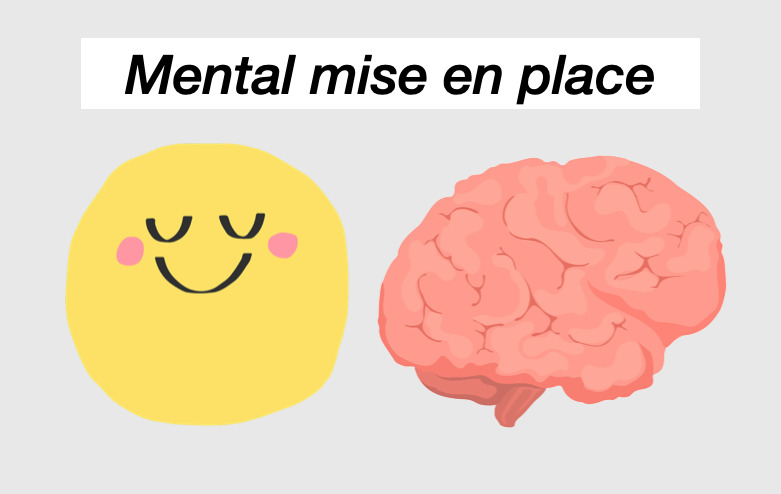
Ask yourself:
What must I do to mentally prepare myself for deep work/study?
Most of us can’t just scroll on our social media feed for an hour and launch straight into doing focused study. We need to get into the right headspace.
To be clear, I don’t mean you need to feel motivated, inspired, or in the right mood to study. Too often, we wait for motivation to strike, and it never comes. However, it certainly helps to be calm, focused, and grounded.
My mental preparation for the workday starts the evening before. Too many late nights have taught me that to wake up feeling calm and grounded, I need to go to bed at a reasonable hour.
When I wake up, I protect this mental calm by:
• Going for a walk or lifting heavy weights
• Doing a mini meditation (usually 3-5 minutes)
• Eating a healthy breakfast
• Avoiding checking my email and touching my computer first thing
• Journaling or mind mapping with pen and paper
I stay away from screens for as long as possible. This is essential for cultivating a calm mental state where I feel proactive and in control of my day.
I know I’m in trouble if I skip too many of the things on the list and start the day by checking my email. It becomes much more challenging to focus and get things done.
What is a pest of the mind?
It is anything that overstimulates the mind and leaves one feeling frenzied, scattered, and/or jangled.
Here’s the thing about learning information at a deep level: it requires you to slow down. You cannot rush it, like a 15-minute butter chicken dish.
But we engage with people, places, and things on a daily basis that speed up our thinking. In this overstimulated, wired mental state, learning feels like a hard slog.
Here’s a tip: start to notice the things that leave you feeling overstimulated. It can be incredibly liberating to cut back on these things or eliminate them completely from your life.
I am constantly tweaking my workspace and experimenting with different tools to help me click into a state of flow with my work. Here are some tools that I’m currently enjoying having as part of my study mise en place:
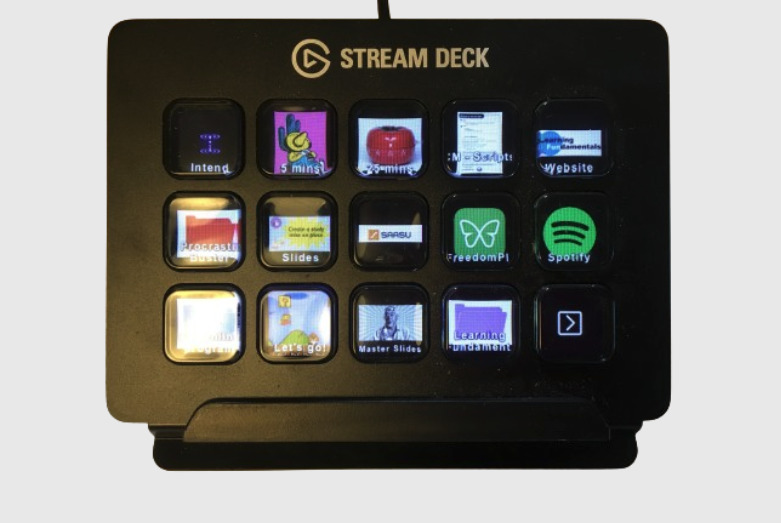
Technically, this is a gaming device that allows gamers who stream to switch scenes, adjust audio, etc at the tap of a button. I’m not a gamer, but I use my Stream deck to get started with various tasks and projects I feel resistance towards.
Instead of thinking, “Where is this file located? How do I get to it?” I tap a button on the Stream deck and it opens the file up. I tap another button, and it opens an application I frequently use.
No more frustrating clicking through numerous folders trying to find the document I need! The Stream deck helps to remove a big mental barrier and kick-start the work process with ease.
Stream decks aren’t cheap but if you can find one secondhand or on special like I did, they are well worth it.
Staying hydrated is super important. I fill a big jug with water every morning and place it on my desk with a glass. If water is within arm’s reach and I can see it, I find myself taking regular sips throughout the day.
I used nasty, cheap pens for years. Being a sucker for free stuff, I collected free pens at career expos and university open days. Without even realising it, these pens caused me a great deal of frustration and irritation.
These days, when it comes to pens, I don’t mess around with junk. There’s one pen I love using: the uniball signo (0.7). It’s a gel pen (you can find them at Officeworks). Writing with this pen is an absolute pleasure.
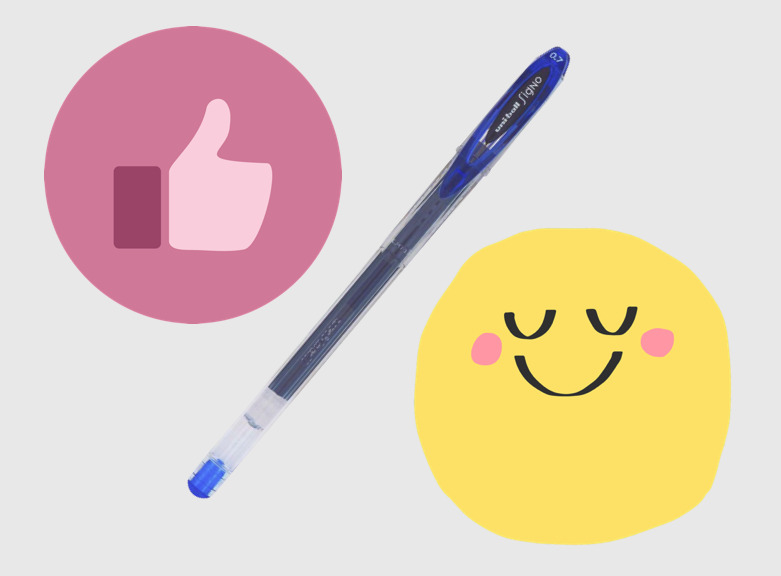
As Kevin Kelly says:
“Take note if you find yourself wondering “Where is my good knife?” or “Where is my good pen?” That means you have bad ones. Get rid of those.”
It’s super handy to have a notepad to jot down ideas and random thoughts as they arise. I recently discovered Rhodia notepads (a recommendation by The Pen Addict, Brad Dowdy). Writing on this paper feels like writing on butter!

Whenever I notice I’m procrastinating, I’ll set my timer for 10 minutes and say, “All I need to do is 10 minutes on this task. That’s all. Just 10 minutes”. I set the timer and away I go.
Other times, when my workspace looks like a mess, I’ll set a timer for 3 minutes and spend that time getting things back in order.
My planner tells me what to do and when to do it. For the last 6 weeks, I have been experimenting with Cal Newport’s time blocking method (planning my day in hourly blocks). It sounds torturous, but it’s strangely liberating.
When I open my planner, I can see what is happening for the week, but I don’t have a sense of the bigger picture. This is why I printed out a massive (A0 size) year-in-a-glance planner to schedule all my presentations, holiday breaks, special events, etc.
Having this calendar makes me feel more in control of my life. I can see when I have busy periods of presenting and when I need to balance those periods with extra rest time to sustain myself. I can also see events and deadlines relatively to where I am now.
These are just a few things I love having in my study/work mise en place. But we’re all different, so you need to figure out what works best for you.
When I recently asked a group of high school students what items they would need in their study mise en place, here’s what they came up with:
• Snacks
• Phone
• Pencil case
• Squishmallows
The first three suggestions didn’t surprise me, but the squishmallows sure did (the students were shocked that I’d never heard of a squishmallow before). I had to google them (they are soft toys).
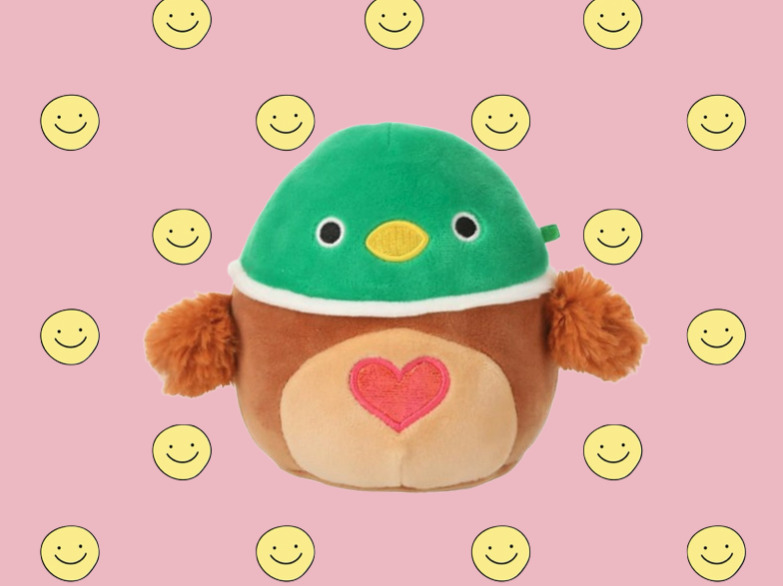
But I get it.
A squishmallow is fun.
It’s comforting.
It makes you feel good.
If something makes you feel good, go put it on your desk. Because if you feel good, it will be easier to think and learn.
The mise en place is a skill that can help all of us (not just chefs) focus on the task at hand. The point is you need to make your study mise en place work for you. You need to find the combination of ingredients that hits the spot.
Like a top chef has their favourite chopping knife, you’ll have your favourite pen. Spend some time experimenting with various tools and different work setups. By creating a more streamlined and organised study space, you’ll get that time back. Plus, you’ll find it’s much easier to get going and keep going with your work.
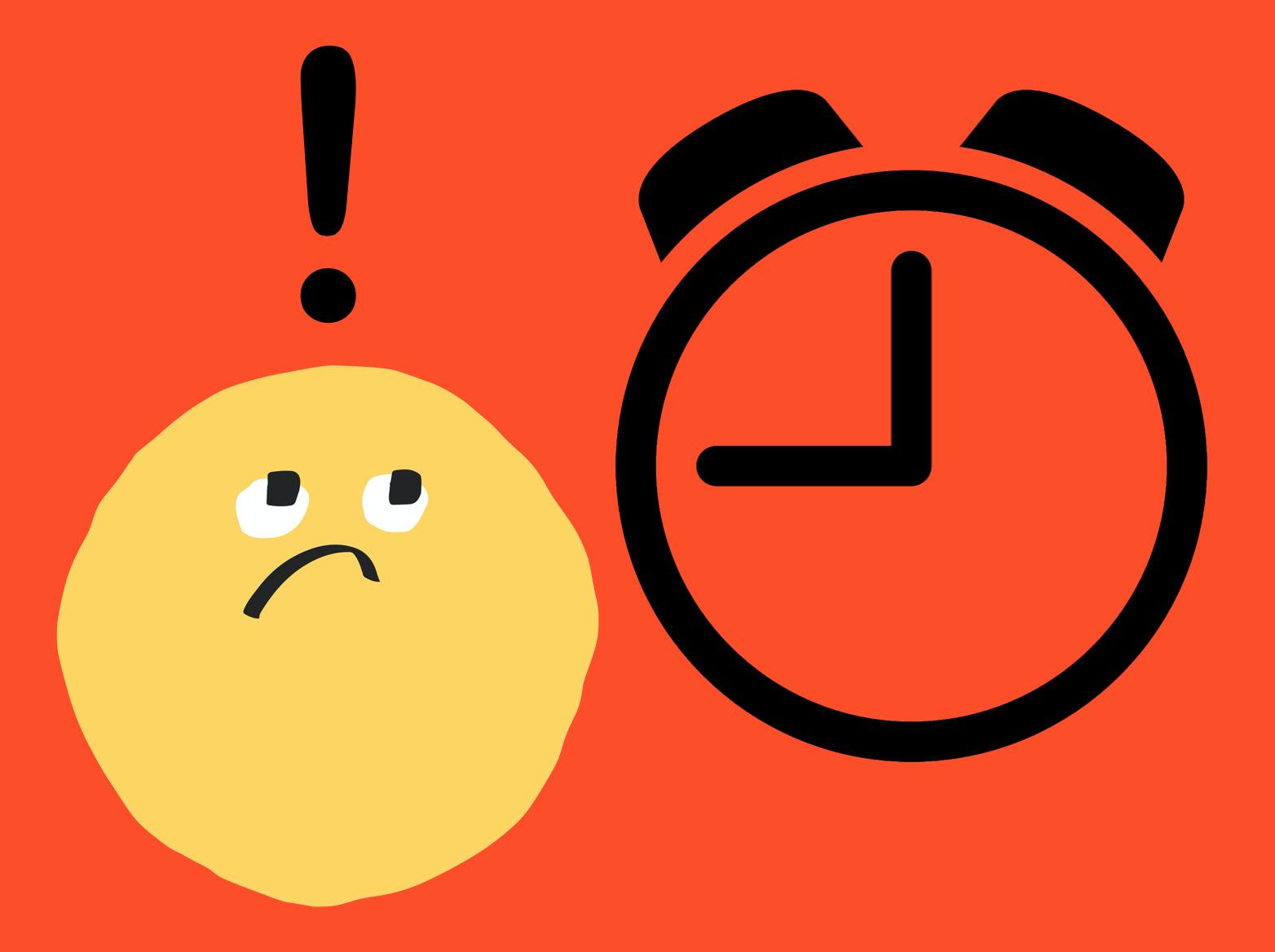
This is what my life used to feel like.
I was always in a rush.
Always cutting it fine.
Often running late.
I was late for class.
Late for dinner at friends’ houses.
Late for meetings.
In my world, being late was the norm. It was perfectly acceptable to drag your feet and rock up an hour late to an event.
So, I had to learn the hard way.
One morning, I was running late for school. I rocked up to form room three minutes late, and I knew straight away I was in trouble.
My form room teacher said:
“Jane, go to student services to get a late note. You’ve been late too many times. It’s not good enough”.
When you were told to go to student services, this was bad news. You were being told to do the walk of shame.
I pleaded with her:
“Please, no! Come on! It was my dad’s fault. He was late in driving me to school. My dad is always running late”.
My form room teacher wasn’t buying my excuses.
To this day, I can still remember that walk to student services. I felt frustrated and stressed out of my mind.
It wasn’t fun being late all the time. I wanted to be on time and feel less rushed and more in control. But I had no idea how to break this bad habit.
One thing was clear to me: people weren’t happy when I was late. People would get annoyed. Passive aggressive vibes were always coming my way.
Fast forward 20 years: I’m no longer someone who is always running late and rushing around. I’m certainly not perfect, but I can say I’ve come a long way.
From my experience, I can tell you it’s exhausting being someone who is always running late for things. When you live like this, you add so much unnecessary stress, drama, and anxiety to your day.
Your days take on a frenetic feel as you rush from one thing to the next.
But there’s also a larger cost to society.
This is what the famous Good Samaritan study examined. It looked at how being rushed and time pressured impacted people’s behaviour and thought processes.
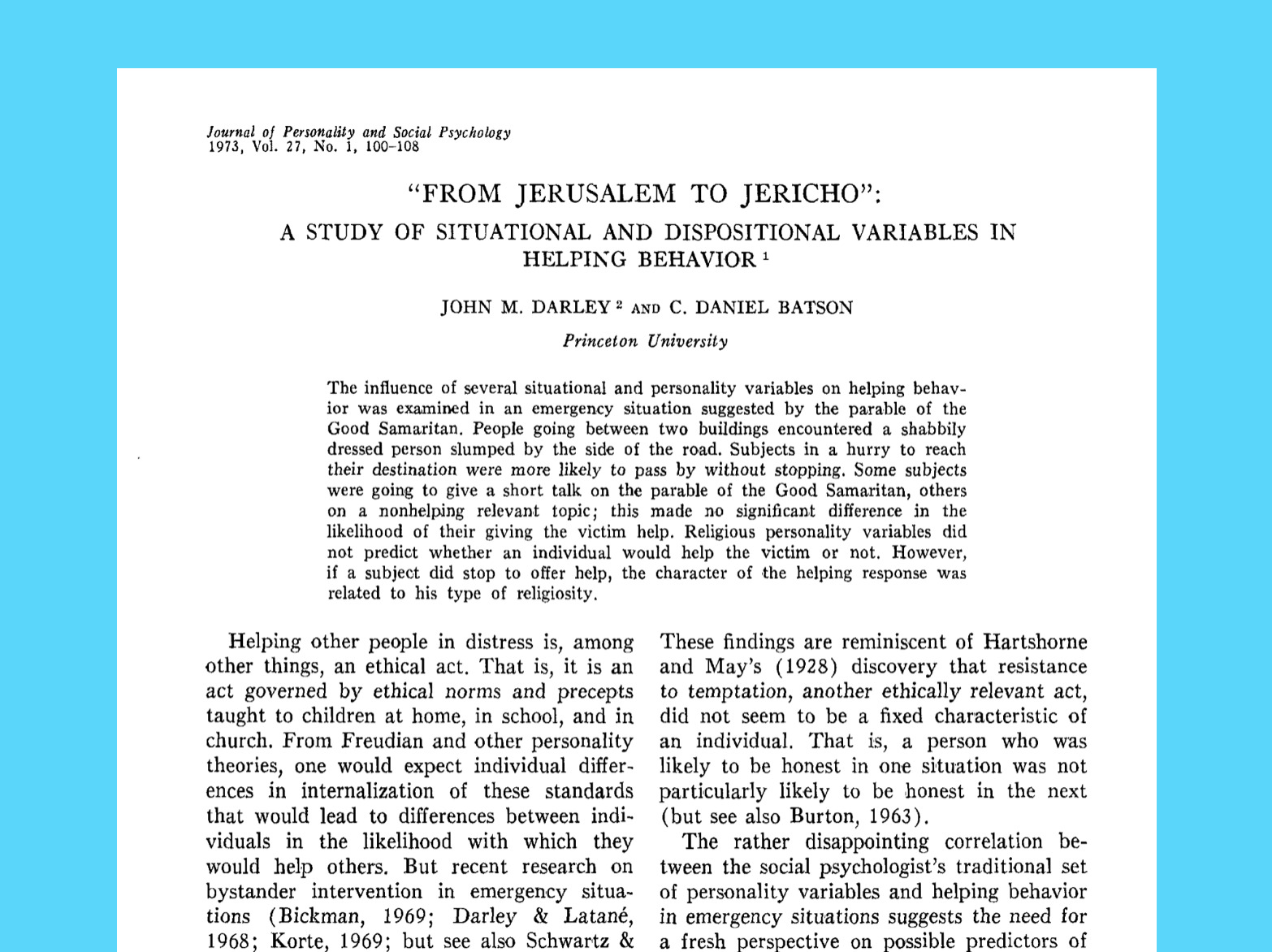
In this fascinating study, researchers conducted a psychological experiment with a group of theology students who were training to be church ministers. This was one of those psychological experiments where participants were deceived (they were told the researchers were studying one thing when they were studying something else). Here’s what happened . . .
The participants were told they were participating in a study on jobs for theology students and were asked to fill in some questionnaires (this was the bogus part of the experiment).
The real experiment took part in the next phase . . .
After the questionnaires were filled in, the participants were told they had to deliver a presentation in another university building, which was a short walk away. The students were instructed they would need to tell the story of the Good Samaritan (a story about a Samaritan who helps a stranger who has been robbed, beaten up by bandits and left half dead).
They were handed a map and provided instructions on how to get to the building, which involved passing through a dim, dingy, and drab alley.
Students were placed in one of three groups:
• High-hurry group
• Intermediate-hurry group
• Low-hurry group
After they were handed the map, the students in the high-hurry condition were told:
“Oh, you’re late. They were expecting you a few minutes ago. We’d better get moving. The assistant should be waiting for you, so you’d better hurry. It shouldn’t take but just a minute.”
Students in the intermediate-hurry group were told:
“The assistant is ready for you, so please go right over.”
Students in the low-hurry group were told:
“It’ll be a few minutes before they’re ready for you, but you might as well head on over. If you have to wait over there, it shouldn’t be long.”
While the participants walked to the building where they’d be delivering the Good Samaritan story, they encountered a slumped victim in the alley. This victim was a plant by the researchers.
The victim was an actor who was pretending to be someone in need of help. The actor wore shabby clothes and was slumped in the doorway with his head down and eyes closed. He wasn’t moving.
All the students encountered this actor. As the students walked past, the actor coughed twice and groaned (you couldn’t miss him!).
The participants didn’t know that their behaviour was under surveillance. The researchers observed how the students in each group responded to the actor. Did the participants help the man slumped in the doorway? And if so, how did they help?
Here’s what they found . . .
Low-hurry group: 63% offered help
Intermediate-hurry group: 45% offered help
High-hurry group: 10% offered help
The researchers concluded:
“A person not in a hurry may stop and offer help to a person in distress. A person in a hurry is likely to keep going. Ironically, he is likely to keep going even if he is hurrying to speak on the parable of the Good Samaritan, thus inadvertently confirming the point of the parable. (Indeed, on several occasions, a seminary student going to give his talk on the parable of the Good Samaritan literally stepped over the victim as he hurried on his way!).”
As an aside, after the experiment, the participants took part in a debriefing session where they were told what the research was actually about. The researchers made it clear that they were studying the social forces (i.e. the conditions) a person finds themselves in, and they were not passing judgment on the students’ behaviour.
In life, we can’t always control the conditions we find ourselves in (e.g., a workplace that imposes a ridiculous workload on staff). But some things are often within our control that we can do something about to be less rushed and time pressured.
Doing these things can help us to feel more present, have greater awareness of our surroundings, feel calmer and less stressed, and experience more control of our time.
I’m going to share with you some habits, ideas, and practices you can implement to help you in this area. I’ll start with the simplest habits before progressing to the deeper, more complex practices.
One of the best tools you can buy is a basic watch (preferably one that doesn’t have fancy features like the ability to receive calls or texts).
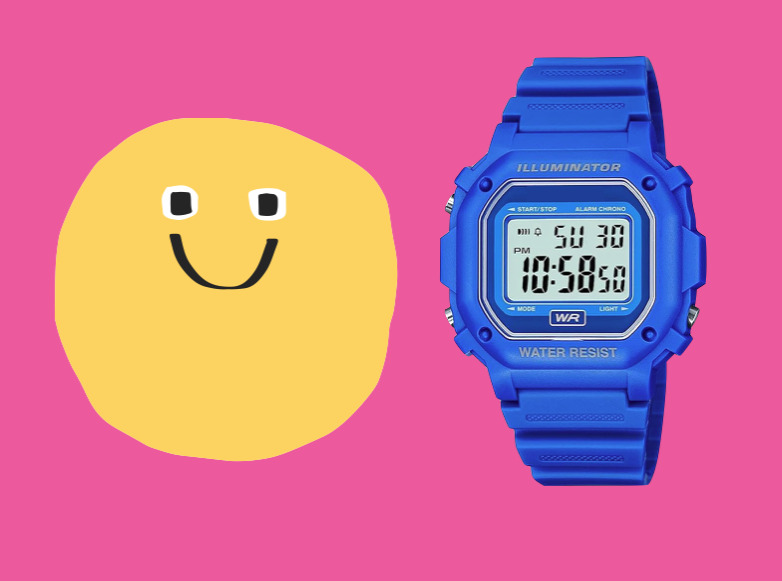
My advice is to wear a watch and look at it regularly.
A lot of people use their phones to check the time, but this can be a time trap (I find my phone way too distracting).
You may look at your phone to check the time but find yourself checking social media while you’re at it. Without any stopping mechanisms in place, you can get sucked in and thrown completely off course.
Tiny Habit:When I wake up in the morning, I will put on my watch.
When I get distracted, I will check my watch and schedule and ask “What do I need to be doing right now?”
The modern world is a distracting place. Even without access to your phone, it’s easy to get derailed. Along with checking your watch regularly, check your timetable/planner/to-do list. Ask the following questions:
• What do I need to be doing right now?
• Am I doing what I need to be doing?
• Is this the best use of my precious time and energy?
Tiny Habit:When I notice I am wasting time, I will look at my to-do list.
A prompt is a reminder. It’s anything that triggers you to move from one task or place to another.
When I need to be somewhere by a certain time, I set my alarm for when I need to leave the house. When I hear the alarm, I grab my bag and take off. No excuses.
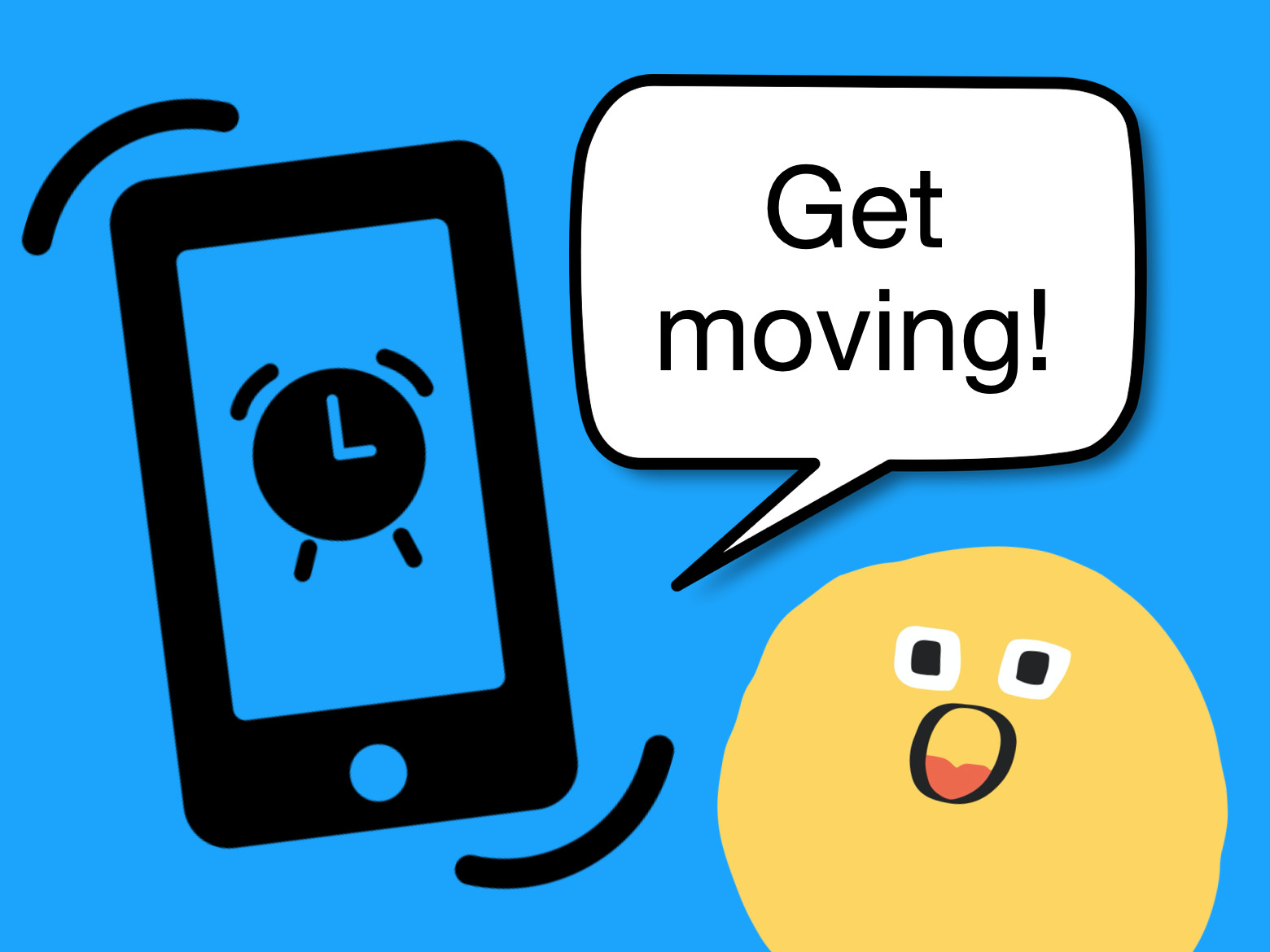
You should have a rough idea of how long it takes to get to school or work. Set your alarm for when you need to leave. When you hear your alarm, get moving.
Tiny Habit:
When I hear my alarm, I will pick up my bag and go.
It’s tempting to cram in a few more tasks before you leave for work or school (e.g., sending one more text or watching one more short video). But ask yourself, “Do I have time to do this?”
The answer is most likely no.
Tiny Habit:When I feel tempted to do another task, I will ask “Do I have time to do this?”
When I was a kid, there was no Internet and no smartphones. But we had morning cartoons on the TV.
These cartoons were fun to watch and could easily capture your attention. But you still had some awareness of the time because the time was always displayed in the corner of the screen.

The major problem with most social media apps is they don’t contain clear time cues. This is a deliberate design decision. They want you to lose track of time. Thirty minutes online can feel like three minutes.
The solution is to stay offline in the mornings. If you must go online, have a strict log-off time. I recommend setting an electronic timer for a set time or using an Internet Blocker app to kick you off.
I use an Internet blocker app called Freedom. This app cost me a bit of money but there’s a free alternative called Cold Turkey.
Tiny Habit:
When I feel the urge to go on social media in the morning, I will set a timer for 5 minutes.
Are you feeling time pressured and running late because you’re trying to do way too much?
Our modern culture encourages us to do more, be more, have more, sleep less, etc. It’s not healthy or sustainable.
If this is the case for you (i.e. you’re overcommitted), I realise it may not be your fault. Maybe your boss or teachers have unrealistic expectations about what you can accomplish in a day.
All that being said, your packed schedule may also be due to your inability to say no. Perhaps you feel like you need to say yes to every opportunity that comes your way to build an impressive resume and stand out from the crowd. If so, I get it (I’ve been there).
The major problem with doing too much is it leaves you feeling exhausted. You’re not able to fully engage in the task. As you do the activity, you’re worrying about the next thing you need to do.
If you’re doing a bunch of stuff and not enjoying it, perhaps it’s time to cut back on a few activities.
When you commit to doing less stuff (but more meaningful activities that align with your values), you can do that stuff better. You can also extract a lot more joy from the process.
Tiny Habit:
When I am presented with a new opportunity, I will ask “Is this important to me? Is it something I want to be doing with my time?”
In the book Excellent Advice for Living: Wisdom I Wish I’d Known Earlier, Kevin Kelly states:
“You don’t need more time because you already have all the time you will ever get; you need more focus”.
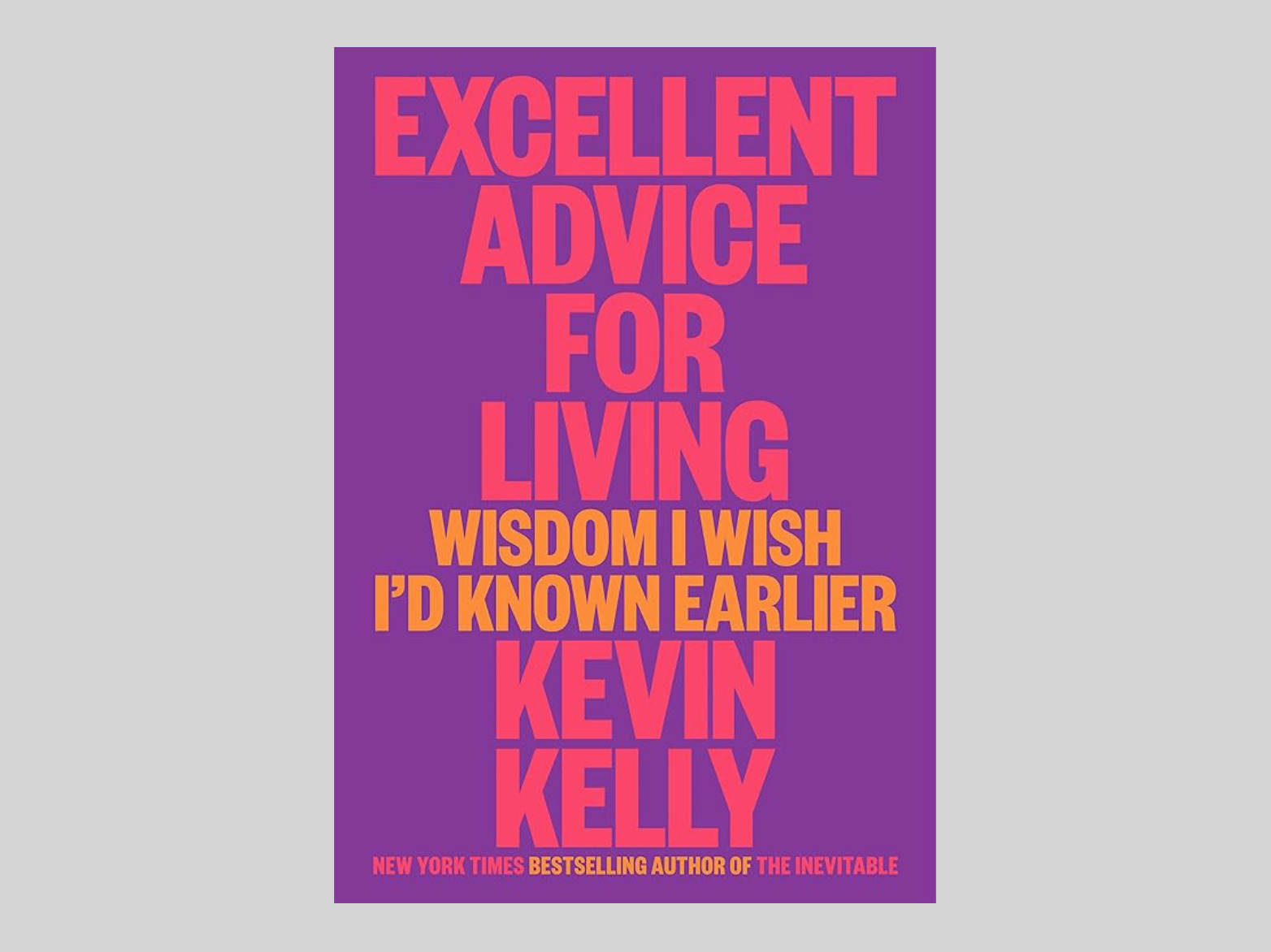
If you find yourself getting distracted by social media apps and YouTube, it’s time to double down on developing your focus muscles.
You can develop your focus muscles by adopting several different habits that relate to the food you put in your mouth, incorporating regular movement and rest breaks into your day, and creating a focus-friendly environment.
This is an area I’ve been working on for a while. What I’ve noticed is when I focus my mind on one task at a time, I can get twice as much done in the time I have available. But I also find that I enjoy the process a lot more, too.
Tiny Habits:
After I stand on my office mat, I will put away three objects on my desk (removing visual clutter)
When I notice my phone is on my desk, I will pick it up and put it in another room.
After I finish doing a deep work sprint (45 minutes), I will do some gentle shoulder rolls.
These habits may sound lame and boring, but they can inject a sense of power, control, ease and even happiness into your day.
When you’re less rushed, you’re less stressed. Because you’re less stressed, the people around you are also more likely to be less stressed (calm is contagious). It also means we end up with a more helpful and thoughtful society.
In our modern world, where we find ourselves increasingly polarised and tribalised, being less rushed and time pressured is something worth striving for.
Dr Jane Genovese delivers interactive sessions on learning to learn, combating procrastination, exam preparation, how to focus in the age of distraction, habit formation and much, much more!
Get FREE study and life strategies by signing up to our newsletter:
© 2024 Learning Fundamentals